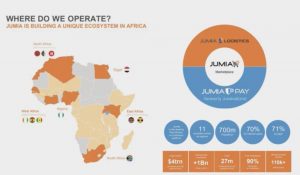Jumia Technologies: Pioneering E-Commerce in Africa
Jumia Technologies, often dubbed the “Amazon of Africa,” is one of the most prominent e-commerce platforms on the continent. Founded in 2012 by Sacha Poignonnec, Jeremy Hodara, Tunde Kehinde, and Raphael Afaedor, Jumia has become a household name in many African countries. It has not only revolutionized online shopping in Africa but also played a significant role in shaping the continent’s digital economy. This blog delves into the journey of Jumia Technologies, its impact on e-commerce in Africa, and the challenges and opportunities that lie ahead.
The Genesis of Jumia: A Vision for Digital Transformation in Africa
Jumia was born out of a vision to bring the convenience of online shopping to African consumers. The founders recognized the growing demand for digital services in Africa, a continent with a rapidly expanding middle class and increasing internet penetration. Despite the challenges of infrastructure and logistics, they were determined to create an online marketplace that would cater to the unique needs of African consumers.
Jumia started in Nigeria, the most populous country in Africa, where it quickly gained popularity by offering a wide range of products, from electronics to fashion. The platform was designed to cater to the local market, with a user-friendly interface, multiple payment options, and a robust logistics network. As Jumia expanded its operations to other African countries, it became the go-to platform for millions of consumers looking for convenient and reliable online shopping.
Jumia’s Business Model: Adapting to the African Market
One of the key factors behind Jumia’s success is its ability to adapt its business model to the unique challenges of the African market. Unlike in more developed regions, where logistics and payment systems are well-established, Africa presents a more complex landscape. Jumia had to build its logistics network from the ground up, often partnering with local delivery services and even developing its delivery fleet.

Image source: Jumia
Another critical aspect of Jumia’s business model is its focus on mobile commerce. Given that many Africans access the internet primarily through mobile devices, Jumia has optimized its platform for mobile use, ensuring that customers can shop easily from their smartphones. Additionally, the company has introduced JumiaPay, a secure payment solution tailored to the needs of African consumers, many of whom do not have access to traditional banking services.

Image source: Jumia
Success Stories: How Jumia is Transforming E-Commerce in Africa
Jumia’s impact on the African e-commerce landscape is evident in the success stories of its customers and partners. Small businesses across the continent have benefited from the platform, gaining access to a broader customer base and increasing their sales. For example, a fashion retailer in Kenya reported a significant increase in sales after joining Jumia, as the platform provided a much-needed boost in visibility and customer reach. Another success story is that of a local electronics manufacturer in Nigeria. By partnering with Jumia, the manufacturer was able to sell its products to customers across the country, overcoming the challenges of distribution and logistics. This partnership not only increased the manufacturer’s sales but also contributed to the growth of the local economy.

Image source: Jumia
Moreover, Jumia has played a crucial role in introducing international brands to the African market. By providing a platform where global companies can reach African consumers, Jumia has helped bridge the gap between Africa and the rest of the world, fostering cross-border trade and economic growth.
The Impact of Jumia on Africa’s Digital Economy
Jumia’s influence extends beyond e-commerce; the company has been a driving force in the digital transformation of Africa. By promoting online shopping, Jumia has contributed to the growth of internet usage across the continent, encouraging more people to go online and explore digital services. This shift has had a ripple effect on various sectors, including finance, logistics, and marketing.

Image source: Jumia
Furthermore, Jumia’s success has inspired the growth of the tech ecosystem in Africa. The company’s presence has encouraged the emergence of startups and tech hubs across the continent, creating jobs and fostering innovation. As Africa’s digital economy continues to evolve, Jumia is likely to play an even more significant role in shaping its future.
Challenges and Controversies: Navigating the Complex African Market
While Jumia has achieved remarkable success, its journey has not been without challenges. The company has faced logistical hurdles, including the need to build a reliable delivery network in regions with poor infrastructure. Additionally, the issue of payment fraud has been a significant concern, with Jumia having to implement strict security measures to protect both customers and sellers.
Jumia has also faced controversies, particularly around its financial performance. In 2019, the company went public on the New York Stock Exchange, becoming the first African tech startup to do so. However, the IPO was followed by reports of financial mismanagement and inflated sales figures, leading to a sharp decline in its stock price. These challenges have raised questions about Jumia’s long-term viability and its ability to turn a profit.
Despite these challenges, Jumia has continued to innovate and adapt, focusing on improving its services and expanding its reach across Africa. The company’s ability to navigate the complexities of the African market will be crucial in determining its future success.
The Future of Jumia: Expanding Horizons
Looking ahead, Jumia is poised to continue its growth and expansion across Africa. The company has announced plans to strengthen its logistics network, enhance its payment solutions, and explore new markets. Additionally, Jumia is investing in technology and data analytics to better understand customer behaviour and improve the overall shopping experience.
Jumia’s journey is a testament to the potential of e-commerce in Africa. As the continent’s digital economy continues to grow, Jumia is well-positioned to lead the way, providing a platform that connects consumers, businesses, and brands across the continent.
Join me in exploring innovative solutions across the globe, by subscribing to my YouTube channel, and Instagram. Subscribe and Share this blog for more tech insights and stay ahead of the curve.



